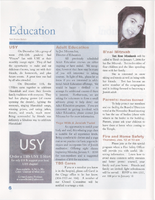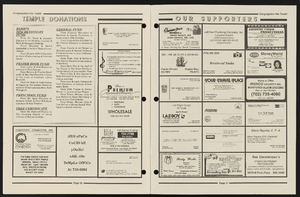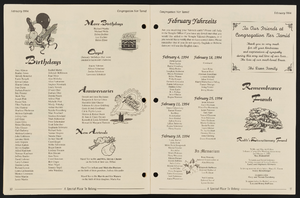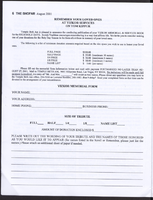Search the Special Collections and Archives Portal
Search Results
Mo Denis (Nevada Legislature, Senator) oral history interview conducted by Magdalena Martinez: transcript
Date
2022-07-28
Archival Collection
Description
From the Lincy Institute "Perspectives from the COVID-19 Pandemic" Oral History Project (MS-01178) -- Elected official interviews file.
Text
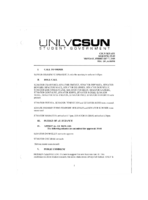
Meeting minutes for Consolidated Student Senate, University of Nevada, Las Vegas, February 07, 2005
Date
2005-02-07
Archival Collection
Description
Includes meeting minutes and agenda.
Text
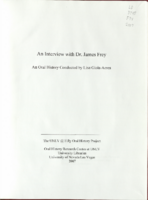
Transcript of interview with Dr. James Frey by Lisa Gioia-Acres, February 14, 2007
Date
2007-02-14
Archival Collection
Description
James Frey was born in Eureka, South Dakota, in 1941. His father worked in creamery and his mother was a registered nurse. When James was nine, the family,including his twin sister, relocated in Sioux Falls where his dad was plant manager for a dairy. He joined the YMCA in the fourth grade and ended up working for them until James attended Augustana College in Sioux Falls, graduating with a major in sociology and a minor in history. After graduation, he worked for three years at the YMCA in Sioux Falls as program director. He earned his master's degree in sociology at the University of Iowa in two years, and was hired at the YMCA in Whittier, California, where he worked for three years. While working in Whittier, James was offered a fellowship to Washington State University in Pullman. He committed to completing his doctorate in three years, and while still working on his dissertation began sending out applications. He sent one to UNLV and arrived in Las Vegas for an interview in 1974. James was hired as assistant professor of sociology at UNLV, and immediately established a survey center at the university. He also converted his dissertation into a book length manuscript and had it published, followed by other books and articles over the years. He conducted a survey on a very high-profile political race between Sheriff Ralph Lamb and his opponent, John McCarthy, which led to work for the State of Nevada, Yucca Mountain, and other entities. The survey program was eventually named the Cannon Center for Survey Research, after Senator Howard Cannon. In the course of his career, James was tenured, taught in London under a university sponsored program, spent a sabbatical in Washington, D.C., doing research, taught several classes, and served seven years as dean. He has detailed memories of the contributions of several university presidents, including Brock Dixon, Pat Goodall, Robert Maxson, Kenny Guinn, and Carol Harter. Today, Dr. James Frey and his wife of over thirty years, Carol, are both retired. He has made a smooth transition to president of his Rotary Club, Chairman of the Nevada Humanities group, and spectator at UNLV basketball and football games. He and his wife plan to stay in Las Vegas, close to their son and friends and neighbors they know and love.
Text
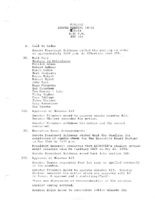
Meeting minutes for Consolidated Student Senate University of Nevada, Las Vegas, May 8, 1984
Date
1984-05-08
Archival Collection
Description
Includes meeting agenda and minutes. CSUN Session 14 Meeting Minutes and Agendas.
Text
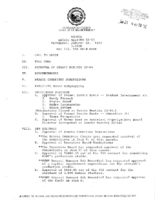
Meeting minutes for Consolidated Student Senate University of Nevada, Las Vegas, January 29, 1992
Date
1992-01-29
Archival Collection
Description
Includes meeting agenda and minutes with additional information about senate bills.
Text
Pagination
Refine my results
Content Type
Creator or Contributor
Subject
Archival Collection
Digital Project
Resource Type
Year
Material Type
Place
Language
Records Classification

